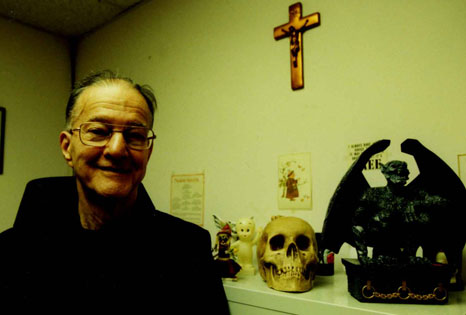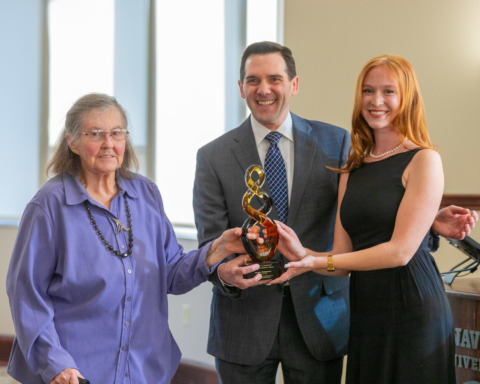Fans of cinematography will find themselves anxiously waiting for a season two premiere of Mindhunter, a new original series by Netflix.
The release of Mindhunter season one was released on Oct. 13, but with only 10 episodes, the finale feels abrupt. In contrast to that feeling, the acting and directing phenomenally grasp viewers with every episode. The finale brings the entire series together with an ending some viewers could have seen coming (spoilers to come).
Episode one introduces the main characters for the remainder of the season. Main character Holden Ford is played by Jonathan Groff. The camera mostly follow Ford’s life and how his attitude shifts throughout the season.
Holt McCallany plays Bill Tench, Ford’s close associate and partner. Debbie Mitford, the role of Ford’s girlfriend played by Hannah Gross, plays a large role as Ford’s sounding board for most of his ideas and some successes.
The first episode escalates pretty quickly as a man holding a woman hostage shows himself naked. Moments later he proceeds to shoot himself in the head with a shotgun—making for a gruesome and abrupt opening.
As Ford agrees to an instructor position at FBI Headquarters in Virginia, he teaches students how to deal with the complex psychology of some of their suspects. Ford’s ultimate goal is to understand the sociopathic mind. Unsure of the effectiveness of Ford’s classes, the director puts Ford on the road with Tench—the beginning of their partnership.
For the rest of the season, in the show’s intro, viewers see a man in Witchita, Kansas angered by his boss. This man turns out to be Dennis Rader, or the “BTK Strangler.” For the remaining eight episodes, they show Rader. There is not much explanation as to what he’s doing, but viewers can assume he’s preparing to hurt someone.
The criminals featured in Mindhunter are all famous murderers from the ‘70s. Ford proposes visiting some prisons with famous killers, such as Edmund Kemper. Kemper proves himself to be quite insightful yet also a sociopath, Ford and Tench must tread lightly.
Despite tragic and complex murder cases, Ford can’t help but feel excited when he hears of a new case. He knows that this is his opportunity to practice all of the methods he teaches.
Ford’s obsessive attitude towards his work is starting to become prevalent in almost all aspects of his life. A critical character is introduced in the third episode. She’s a highly respected scholar who studies criminals similar to Kemper. Her name is Wendy Carr with her own set of secrets. She ends up jumping on board with Tench and Ford to crack cases.
Tench’s personal life takes a big part out of him during the season, partly due to his chronic bad mood. By episode four, the pair has moved their focus from Kemper, only briefly, to a different serial killer: Monte Rissell. With each episode, Ford’s and Tench’s partnership grows stronger.
The pair gets sidetracked with a case in Altoona, Pennsylvania, when a woman is found horribly mutilated in episode five. A woman with a mysterious past finds herself engaged to a local man who has never really made anything of himself. The whole situation seems a little too good to be true, and the suspects quickly crack under Ford’s pressure. Billy Jean’s fiancé becomes more and more convincing as her murderer.
Episode six focuses on the personal lives of the characters. Tench and his wife invite Ford and his girlfriend, Debbie, over for dinner. Here, the dynamics of Tench’s marriage and Ford’s relationship are being laid out in a vulnerable way. Tench’s family struggles are blatant to Debbie and Ford.
Jerry Brudos, a man who kept up two different personalities, plays as a theme to episode seven. Brudos was serving a life sentence for mutilating women, but somehow his family had no idea who he really was or what he was really doing.
At one point, Brudos claims to have talked to Kemper and said that Kemper called Ford and Tench idiots. Ford was very startled by this claim, but Tench knew not to play into it. This shows just how much Ford is letting this project consume his life.
Immersing himself in his work starts to backfire around episode eight. Ford talks to elementary school students for their Career Day. Much of Ford’s preferred vocabulary, which is blatantly too vulgar for elementary-age children, is redacted by Principal Roger Wade.
Later, the principal’s touchy-feely relationship with the kids seems harmless, but is brought to Ford’s attention anyway by some teachers. Wade is accused of tickling his students’ feet, and he admits to it. Some parents complained that it makes them uncomfortable. Wade is offended at Ford’s warning to rethink his actions. Wade is later fired for these allegations.
Ford’s life is slowly spinning out of control. This is apparent in episode nine. Ford’s lies are piling up. He gets candid with a famous criminal, Richard Speck, when he’s not as easy to pull information out of as the others. Ford uses highly inappropriate language in order to encourage conversation out of Speck.
In Georgia, Ford is trying to solve a murder of a 12-year-old girl. He gets cocky about his ability to encourage his suspects to confess their crimes. His attitude has reflected poorly in his relationship with Debbie, and she breaks up with him.
In the final scenes, Ford breaks down and visits Kemper in a hospital after he tried to take his own life. Things get tense quickly, and the episode ends with what seems like a mental break for Ford.
Although fans are impatient for any information of a season to follow up the cliffhanger in season one finale, there has not been a season two release date as of yet. All of season one is available on Netflix.









